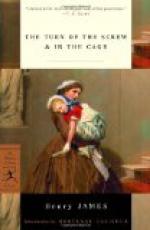Mrs. Jordan, in the elation of it, had begun to revive; but there was nevertheless between them rather a conscious pause—a pause in which neither visitor nor hostess brought out a hope or an invitation. It expressed in the last resort that, in spite of submission and sympathy, they could now after all only look at each other across the social gulf. They remained together as if it would be indeed their last chance, still sitting, though awkwardly, quite close, and feeling also—and this most unmistakeably—that there was one thing more to go into. By the time it came to the surface, moreover, our young friend had recognised the whole of the main truth, from which she even drew again a slight irritation. It was not the main truth perhaps that most signified; but after her momentary effort, her embarrassment and her tears Mrs. Jordan had begun to sound afresh—and even without speaking—the note of a social connexion. She hadn’t really let go of it that she was marrying into society. Well, it was a harmless compensation, and it was all the prospective bride of Mr. Mudge had to leave with her.
CHAPTER XXVII
This young lady at last rose again, but she lingered before going. “And has Captain Everard nothing to say to it?”
“To what, dear?”
“Why, to such questions—the domestic arrangements, things in the house.”
“How can he, with any authority, when nothing in the house is his?”
“Not his?” The girl wondered, perfectly conscious of the appearance she thus conferred on Mrs. Jordan of knowing, in comparison with herself, so tremendously much about it. Well, there were things she wanted so to get at that she was willing at last, though it hurt her, to pay for them with humiliation. “Why are they not his?”
“Don’t you know, dear, that he has nothing?”
“Nothing?” It was hard to see him in such a light, but Mrs. Jordan’s power to answer for it had a superiority that began, on the spot, to grow. “Isn’t he rich?”
Mrs. Jordan looked immensely, looked both generally and particularly, informed. “It depends upon what you call—! Not at any rate in the least as she is. What does he bring? Think what she has. And then, love, his debts.”
“His debts?” His young friend was fairly betrayed into helpless innocence. She could struggle a little, but she had to let herself go; and if she had spoken frankly she would have said: “Do tell me, for I don’t know so much about him as that!” As she didn’t speak frankly she only said: “His debts are nothing—when she so adores him.”




